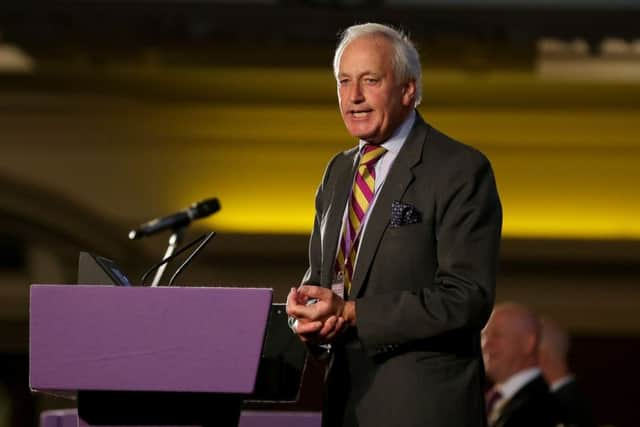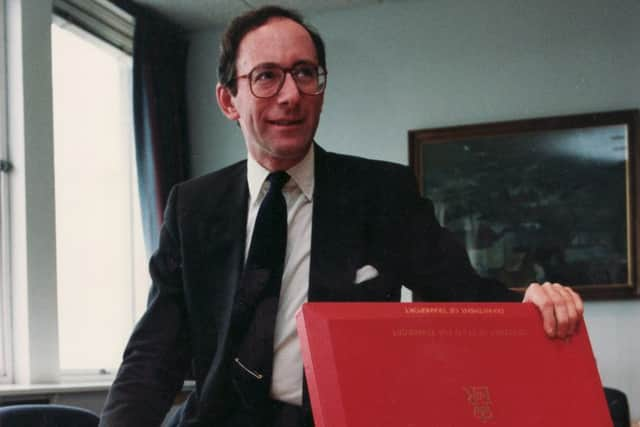Allan Massie: Politicians need outside interests


SHOULD membership of a parliament or assembly – in London, Edinburgh, Cardiff or Belfast – be regarded as a full-time job, or should politicians be entitled to earn money from other activities?
Many today are offended by the suggestion that they should. We elect them to serve us, they say, and pay them quite a handsome salary to do so. So we are right to expect them to give their full attention to the job and have no outside earnings. This view may be regarded as an example of the New Puritanism.
Advertisement
Hide AdAdvertisement
Hide AdHistorically of course it’s nonsense. Being a Member of Parliament was never – or at least rarely – seen as a full-time occupation. The House of Commons has, for instance, always had a fair number of lawyers among its members, many of whom were back-benchers who continued to practise in the courts. Others had business interests which they still legitimately pursued. Some were farmers, others company directors, and nobody thought anything of it. Indeed many thought it a good thing that MPs should not be confined to politics. Outside interests and work kept them in touch with the world beyond Westminster. When the former foreign secretary Sir Malcolm Rifkind was trapped earlier this year in a newspaper and TV “sting” operation, nothing provoked greater indignation than his assurance that, as a back-bench MP, he had lots of time on his hands – even though he was also chairman of a Commons committee. Yet what he said was obviously true. Any politician who is not a government minister or (perhaps) the leader of a party in Opposition is short of occupation. Constituency work is important, or should be, but it is not necessarily time-consuming. Much of it can be delegated. Much of it should be delegated. Tam Dalyell likes to tell the story of how, as a very young MP, he was ticked off by a local (Labour) councillor, who was, as I remember, his constituency chairman, for having made representations about the condition of pavements in a West Lothian town. “Westminster is your business, Tam,” the councillor said. “Dog-shit on the pavements is mine”. And quite right too. In any case the fact that ministers can combine government office with their duties to their constituents makes the same point.


So Westminster MPs have “time on their hands”. MSPs in Edinburgh have even less to occupy themselves at Holyrood. Their parliament doesn’t operate a five-day week; there are frequent and quite long recesses. Their constituency duties are shared with Westminster MPs and also with their List colleagues. Now some members of the public may like to think that those they elect should regard their parliamentary duty as a full-time job (even if it isn’t), be content with the quite generous, but not munificent, salaries they receive, and not seek to boost their income by outside work. Others however – more realistically perhaps – may think that there’s a lot to be said for politicians keeping at least a foot in what we like to regard as “the real world”. The question is whether as well as having that foot there, they also have a hand in the public till.
Here we arrive at the question of lobbying, which is one of the things that gets people stirred up. Lobbying itself is not improper. Indeed in certain circumstances lobbying is a politician’s duty. A member of any parliament may properly engage in lobbying to protect or advance the interest of his constituency. A rural MP or MSP would, for instance, be negligent if he didn’t lobby in defence of the farming industry. Likewise the threatened closure of a local business or MoD base should attract the attention of the local MP or MSP. Nobody of sense can object to this sort of lobbying.
But what about being a paid lobbyist? This is a grey area. In some circumstances it has always been regarded as proper. Labour MPs have, for instance, been retained by Trade Unions to protect and advance their interests. Other politicians have been retained – as, say, advisers – by business organisations. There is nothing wrong about such connections, so long as politicians are open about them. It has been a convention of the House of Commons that any member speaking on a matter with which he is personally concerned, or on behalf of any organization from which he receives, or expects to receive, payment, should declare his interest. So long as this convention is observed, there seems to me to be nothing improper. Transparency is what matters.
Of course lobbyists – public relations firms – often want more. They want advice on how best to advance their client’s interests. They may seek introductions to ministers or want to know how to find their way through the maze of parliamentary procedure. Again there is no good reason why politicians shouldn’t oblige – always provided their own role is made clear. It is not, incidentally , only “wicked “ capitalists who seek such services from politicians. Charities do this also – often, one suspects, more effectively.
The Puritans who would have politicians prohibited from earning anything beyond their parliamentary salary are unreasonable, because all the evidence suggests that any elected politician who is not a government minister is not actually doing a full-time job, even if many outside politics think it should be that. Moreover, if the Puritans were successful, the consequences would be lamentable. There are frequent, and to some extent justified, complaints about the professionalisation of politics, the development of a political class ignorant of the world beyond parliament, with no interests other than politics. Well, you can’t have it both ways. Deny politicians the right to do other work, and earn money beyond their salary, and you will have what people say they don’t want: a caste of full-time politicians who know nothing but politics. And fewer people with wide interests and varied abilities will be attracted to the political game.